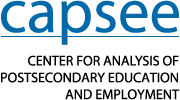Research Agenda
CAPSEE’s research agenda was driven by two broad questions.
1. Taking account of student characteristics and economic conditions (including the Great Recession), what are the employment and earnings benefits of specific educational pathways and awards?
- What are the employment and earnings benefits of short-term occupational degrees and certificates? Used state data from partner states (California, North Carolina, Michigan, Ohio, and Virginia).
- How beneficial are noncredit and adult basic education programs in terms of labor market opportunities and workforce development? Used state data from partner states.
- What is the role of the for-profit postsecondary education sector? Used national surveys and state datasets.
- What is the trajectory of earnings growth for persons who complete any postsecondary education? Used state data from partner states.
CAPSEE researchers examined pathways through postsecondary education and disaggregated results according to field of study and basic student characteristics. They also used national survey data to examine the link between attainment and patterns of interstate mobility.
2. What institutional programs and public policies improve completion rates and employment and earnings outcomes?
- Does on-campus employment (as supported by Federal Work-Study funding) improve educational and employment outcomes? Used BPS survey data.
- What is the prevalence, intensity, and impact of student employment more broadly (including off-campus work)? Used state data from Ohio.
- How does receipt of financial aid affect college performance, persistence, completion, and labor market outcomes? Used state data.
- Do student services such as those provided by the One-Stop Career Centers influence adult students’ choices and pathways? Used state data from North Carolina.
- How can the inconsistent definition of minority-serving institutions (MSIs) be clarified, and what federal policies and programs aimed at increasing students’ educational attainment significantly affect MSIs? Used IPEDS survey data.
- How effective are strategies that seek to improve the math preparedness and success of high school students entering college? Reviewed prior research.
